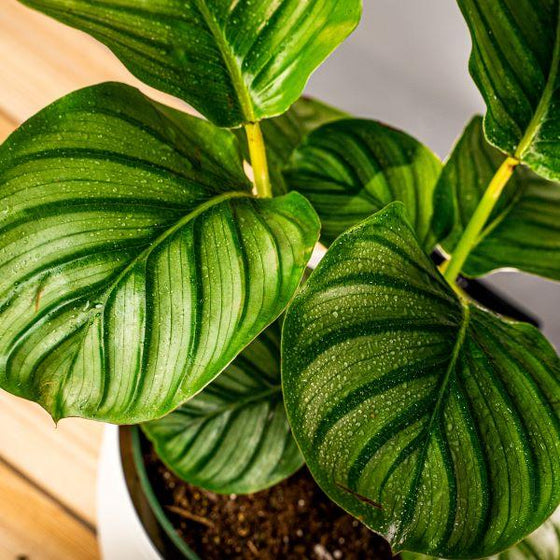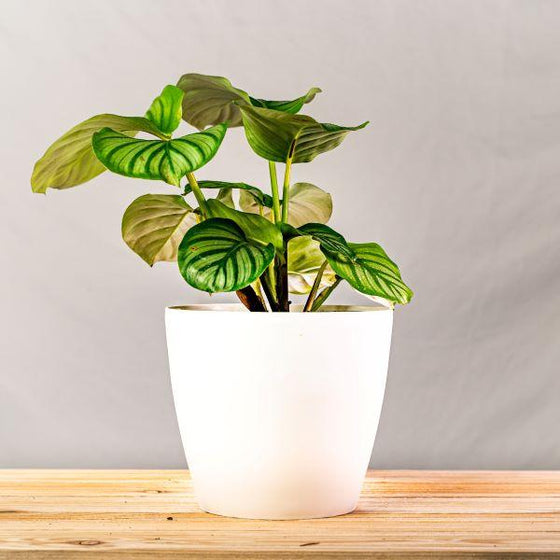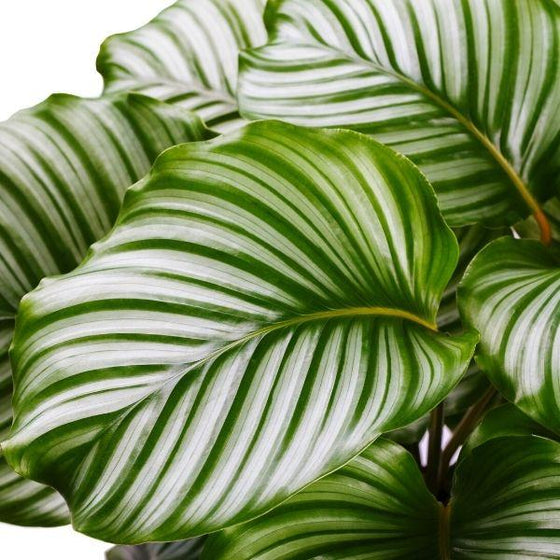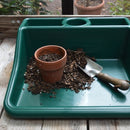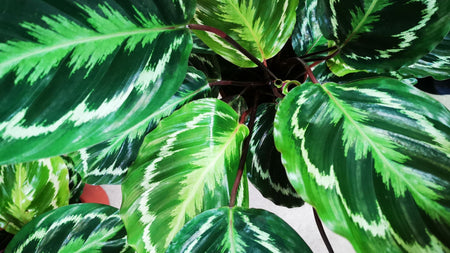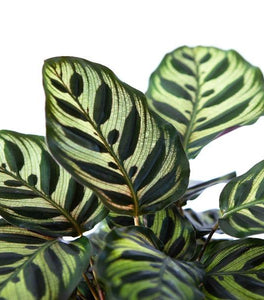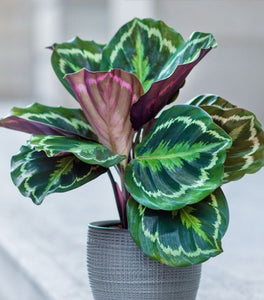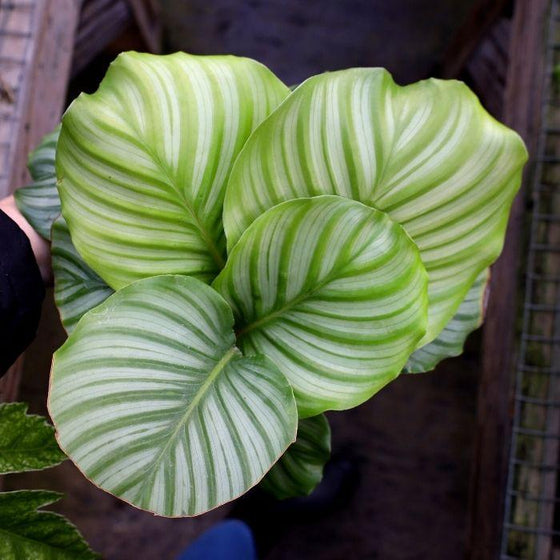
Images Depicted Range in Maturity & Container Size
Pots & Decorations Not Included Unless Otherwise Stated
Calathea Orbifolia: Giant Silver-Striped Leaves for Soft, Tropical Drama
Big, Round, Silver-Striped Foliage
Calathea orbifolia is a true showpiece in the houseplant world. Huge, rounded leaves unfurl in soft waves, each one painted with silvery stripes that radiate from the center like a living mandala. As the foliage catches light, the pattern shifts from soft sage to shimmering silver-green, adding instant calm and luxury to bedrooms, living rooms, and home offices. Unlike many dramatic tropicals, Calathea orbifolia is grown primarily for its foliage, so it looks good every single day—not just when in bloom.
Lush, Low-Mounding, and Wide-Spreading
Rather than growing tall like a tree, Calathea orbifolia forms a low, lush mound of foliage. New leaves emerge from a central crown on short, sturdy petioles, slowly building a complete, rounded silhouette. Indoors, most plants grow to about 18–24 inches tall and 18–30 inches wide in a roomy pot, with individual leaves often reaching 8–12 inches across. The growth rate is moderate: not so fast that it outgrows its space overnight, but steady enough that you’ll notice fresh leaves unfurling regularly in good conditions. This wide, low habit makes it perfect as a floor plant beside a chair, under a window, or on a plant stand where those big leaves can really shine.
Soft Light, Even Moisture, and High Humidity = A Happy Calathea Orbifolia
Calathea orbifolia prefers bright, indirect light—light that’s strong enough to read by but softened by distance or a sheer curtain. It will tolerate medium to lower light, but the striping will be boldest and growth most vigorous with bright, filtered light and zero harsh sun on the leaves. The soil should be kept evenly moist but never soggy. Allow the top inch to dry, then water thoroughly and let the excess drain away. This plant is sensitive to salts and chemicals, so filtered, distilled, or rainwater is ideal if your tap water is hard or heavily treated.
Humidity is the secret sauce with orbifolia. It thrives in a warm, humid environment, with a relative humidity of around 60% or higher. Grouping plants, using a pebble tray, or running a small humidifier nearby will help prevent brown edges and keep the leaves lush. Standard indoor temperatures between 65°F and 80°F are ideal; protect it from cold drafts, sudden temperature swings, and anything below approximately 60°F.
Use Indoors as a Soft, Spa-Like Focal Plant
Think of Calathea orbifolia as interior “landscape architecture” for your home. Indoors, it’s a perfect focal plant in a bedroom, living room, or spa-like bathroom where you want soft, leafy texture without harsh lines. Its broad, rounded leaves and low profile make it an excellent choice for filling empty corners, framing accent chairs, or anchoring plant groupings near north- or east-facing windows.
Because Calatheas are considered non-toxic to pets, orbifolia is a great candidate for households with cats and dogs (though you’ll still want to discourage chewing). It pairs beautifully with other tropical plants—pair it with upright plants like fiddle-leaf figs and palms for height, or with trailing pothos and ferns for a layered, jungle-like look. In warm, frost-free climates, it can summer outside in a shaded, humid spot, then move indoors before temperatures drop.

| Hardiness Zone: | Grown indoors in most climates; outdoor only in frost-free Zones 10–11 |
|---|---|
| Mature Height: | Typically 18–24" tall |
| Mature Width: | 18–30" wide indoors |
| Common Name: | Orbifolia Prayer Plant |
| Sunlight: | Bright, indirect light to medium light; avoid direct sun |
| Flower Color: | Inconspicuous flowers; grown for dramatic striped foliage |
| Soil Conditions: | Rich, well-draining, moisture-retentive potting mix with good aeration |
| Water Requirements: | Keep soil evenly moist; water when top 1" is dry; avoid hard, mineral-heavy water |
| Value: | Generally considered non-toxic to pets and Children |
| Uses: | Large indoor floor plant, plant-stand focal point, bright bathroom or bedroom accent |
How to Care for Calathea Orbifolia
Be sure to read our planting instructions to ensure a healthy and happy Calathea Orbifolia plant for years to come!

How should I plant Calathea orbifolia?
To plant Calathea orbifolia, choose a container with drainage holes that’s just 1–3 inches wider than the current nursery pot. This plant prefers a snug but not cramped root zone. Fill the bottom with a rich, well-draining potting mix—something peat or coco coir–based with added perlite or fine bark to keep it airy yet moisture-retentive. Gently slide the plant from its grower pot, loosen any circling roots, and set the root ball so the top sits level with or just slightly above the surrounding soil line. Backfill around the roots, lightly firming the mix to remove air pockets but not compacting it. Water thoroughly after planting until water drains from the bottom, then allow the pot to drain fully before placing it back on a saucer or in a cachepot. Avoid burying the stems too deeply; the crown should remain at the soil surface to prevent rot. Indoors, position the newly potted plant where it will receive bright, indirect light and stable warmth—away from drafts, heating vents, and direct sun.
How often should I water Calathea orbifolia after planting?
Right after planting, give your Calathea a deep drink to settle the soil. Going forward, aim for consistently moist, never soggy, conditions. Let the top inch of the potting mix dry out before watering again. When it’s time, water slowly and evenly until you see excess begin to drain from the bottom of the pot, then empty any standing water from saucers so the roots are never sitting in it. In warm, bright rooms, this often translates to watering about once a week, though frequency will vary with pot size, temperature, and humidity. In cooler months or lower light, the soil will dry more slowly, so stretch out the intervals. If leaf edges start to crisp even when your watering is on point, the culprit may be hard tap water—switching to filtered or distilled water can make a noticeable difference in leaf quality. Always adjust based on how the soil feels, not just the calendar.
When should I fertilize Calathea orbifolia?
Fertilize Calathea orbifolia lightly during the active growing season, typically from spring through early fall. A balanced, water-soluble houseplant fertilizer diluted to half strength every 4–6 weeks is usually plenty. Feed only after you’ve watered so nutrients are distributed gently through moist soil, reducing the risk of root burn and salt buildup in the pot. If you prefer a more organic approach, consider a top-dressing of worm castings in spring and an occasional dose of diluted organic liquid fertilizer. Calathea orbifolia is more sensitive than some plants to overfeeding, so err on the side of “less but consistent” rather than heavy, frequent feeding. In late fall and winter, when growth slows and the plant rests, stop fertilizing and resume again when days lengthen and new leaves start unfurling in spring.

When and how should I prune Calathea orbifolia?
Calathea orbifolia doesn’t require structural pruning, but regular grooming keeps it looking lush. Use clean, sharp scissors to remove yellowing, browned, or damaged leaves at the base of their stems as you notice them. This encourages the plant to focus its energy on new growth and maintains a tidy silhouette. If just a tip or edge of a leaf is browned but the rest looks healthy, you can carefully trim away the brown portion following the natural curve of the leaf so the cut blends in. Avoid cutting into healthy tissue more than necessary. The best time for any larger cleanup is during the growing season, when the plant can quickly replace lost foliage. Keep leaves dust-free with a soft cloth and room-temperature water so they can breathe and photosynthesize efficiently.

